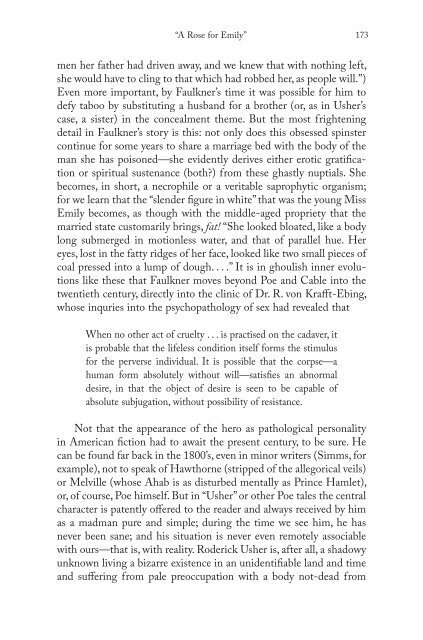Bloom's Literary Themes - ymerleksi - home
Bloom's Literary Themes - ymerleksi - home
Bloom's Literary Themes - ymerleksi - home
Create successful ePaper yourself
Turn your PDF publications into a flip-book with our unique Google optimized e-Paper software.
“A Rose for Emily” 173<br />
men her father had driven away, and we knew that with nothing left,<br />
she would have to cling to that which had robbed her, as people will.”)<br />
Even more important, by Faulkner’s time it was possible for him to<br />
defy taboo by substituting a husband for a brother (or, as in Usher’s<br />
case, a sister) in the concealment theme. But the most frightening<br />
detail in Faulkner’s story is this: not only does this obsessed spinster<br />
continue for some years to share a marriage bed with the body of the<br />
man she has poisoned—she evidently derives either erotic gratification<br />
or spiritual sustenance (both?) from these ghastly nuptials. She<br />
becomes, in short, a necrophile or a veritable saprophytic organism;<br />
for we learn that the “slender figure in white” that was the young Miss<br />
Emily becomes, as though with the middle-aged propriety that the<br />
married state customarily brings, fat! “She looked bloated, like a body<br />
long submerged in motionless water, and that of parallel hue. Her<br />
eyes, lost in the fatty ridges of her face, looked like two small pieces of<br />
coal pressed into a lump of dough. . . .” It is in ghoulish inner evolutions<br />
like these that Faulkner moves beyond Poe and Cable into the<br />
twentieth century, directly into the clinic of Dr. R. von Krafft-Ebing,<br />
whose inquries into the psychopathology of sex had revealed that<br />
When no other act of cruelty . . . is practised on the cadaver, it<br />
is probable that the lifeless condition itself forms the stimulus<br />
for the perverse individual. It is possible that the corpse—a<br />
human form absolutely without will—satisfies an abnormal<br />
desire, in that the object of desire is seen to be capable of<br />
absolute subjugation, without possibility of resistance.<br />
Not that the appearance of the hero as pathological personality<br />
in American fiction had to await the present century, to be sure. He<br />
can be found far back in the 1800’s, even in minor writers (Simms, for<br />
example), not to speak of Hawthorne (stripped of the allegorical veils)<br />
or Melville (whose Ahab is as disturbed mentally as Prince Hamlet),<br />
or, of course, Poe himself. But in “Usher” or other Poe tales the central<br />
character is patently offered to the reader and always received by him<br />
as a madman pure and simple; during the time we see him, he has<br />
never been sane; and his situation is never even remotely associable<br />
with ours—that is, with reality. Roderick Usher is, after all, a shadowy<br />
unknown living a bizarre existence in an unidentifiable land and time<br />
and suffering from pale preoccupation with a body not-dead from
















